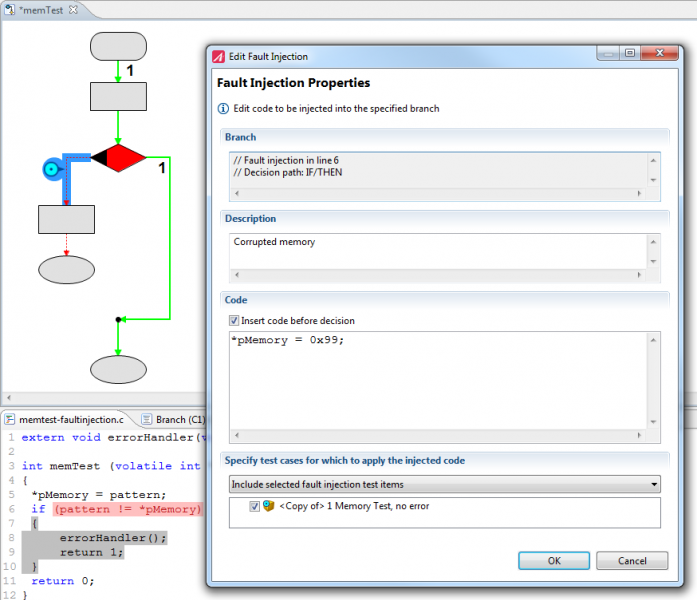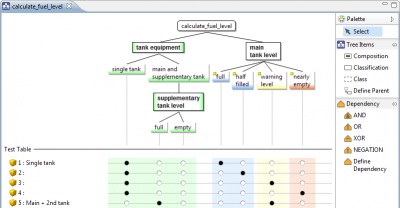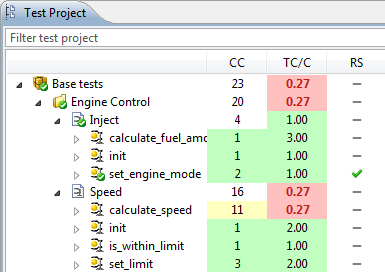
New TESSY 5.1
Innovative Automated Fault Injection Function
Razorcat introduces the latest release of its unit and integration test tool for embedded software: TESSY 5.1 offers new powerful features such as the fault injection and test script perspective as well as a completely newly implemented classification tree editor (CTE).
Fault Injection
Fault injection is a proven method for subjecting the software especially of safety-critical applications to documented tests. For a proven 100% statement coverage, error situations can now be tested completely automatically in TESSY 5.1 with the help of the "Fault Injection" function without changing the source code.
Fault injections are created based on unreached branches of the function flow graph. In regression testing, fault injections are automatically placed in the correct location in the source code even after code changes.
Test Script Perspective
The new script perspective in TESSY 5.1 allows textual editing of tests in a dedicated test scripting language. All test data can be converted from the script format to the TESSY internal format and vice versa. The ASCII format can also be used as a complementary backup format besides the hitherto TMB file format, which simplifies version maintenance and merging of tests in a version control system. This allows easy versioning of tests and comparisons of any versions. The script editor provides syntax highlighting, auto completion, formatting, validation, and an outline view.
New Classification Tree Editor
TESSY 5.1 also ensures greater efficiency with a new implementation of the familiar classification tree editor (CTE). The new CTE is a full Eclipse-based editor integrated in TESSY and enhances the design of test cases and the assignment of test data to tree nodes. Legacy CTE trees are automatically updated and converted to the new CTEX file format. New functions, such as the interdependency of different classes, have also been added.
Static analysis and test case quality metrics
TESSY 5.1 calculates the cyclomatic complexity (McCabe metric) and displays it statistically: The complexity value for each test object is summarized for each module, folder and test collection level and displayed with the sum of all values, the average value or the maximum value. A ratio between the number of test cases and the complexity (TC/C) is determined as a derived measure. This TC/C ratio defines the number of test cases required to achieve 100% branch coverage. A value greater than 1 indicates that the required minimum number of test cases has been defined. Another new measure of the quality of test cases is the result significance (RS), which evaluates test cases: The system checks whether expected test results have been defined for each test case. Test data, use of the call trace and the use of evaluation macros flow into this criterion.
Arithmetic expressions as test data
The Test Data Editor (TDE) has been enhanced in TESSY54.1 with the possibility of entering arithmetic expressions as test data. These expressions can also be defined with the new CTE. The resulting value of an expression is dynamically calculated by TESSY and automatically updated when the code changes. All standard operators are supported: Addition, subtraction, multiplication, division, shift, binary or/and. The operands can be numbers, defines and enum constants.
Stimulation and measurement of hardware signals
To stimulate or measure hardware signals during unit testing, TESSY 5.1 provides a hardware adapter interface that can be used to control external hardware for stimulation and measurement. During the module analysis, TESSY reads the configuration of the hardware interface and displays it with the available I/O signals in the Test Interface Editor (TIE) for each test object. The signal can then be edited in the Test Data Editor (TDE) like any other normal test object variable.
About TESSY
TESSY is Razorcat's powerful and certified unit and integration test tool for C/C++ embedded software. TESSY supports the most common microcontrollers, compilers and debuggers and is qualified for safety-related software development according to IEC 61508 and ISO 26262. Further information and downloads on TESSY 5.1 are available at https://www.razorcat.com/en/tessy.html.
More information about the other embedded software development tools and the comprehensive testing services of Razorcat can be found at www.razorcat.com.




